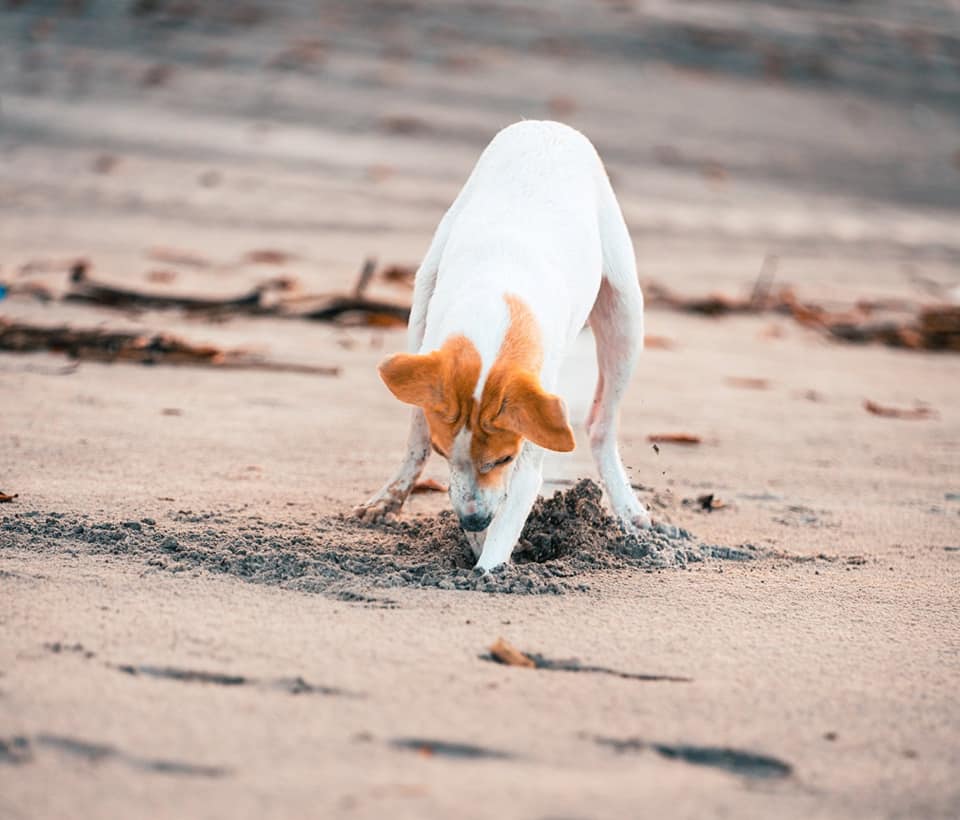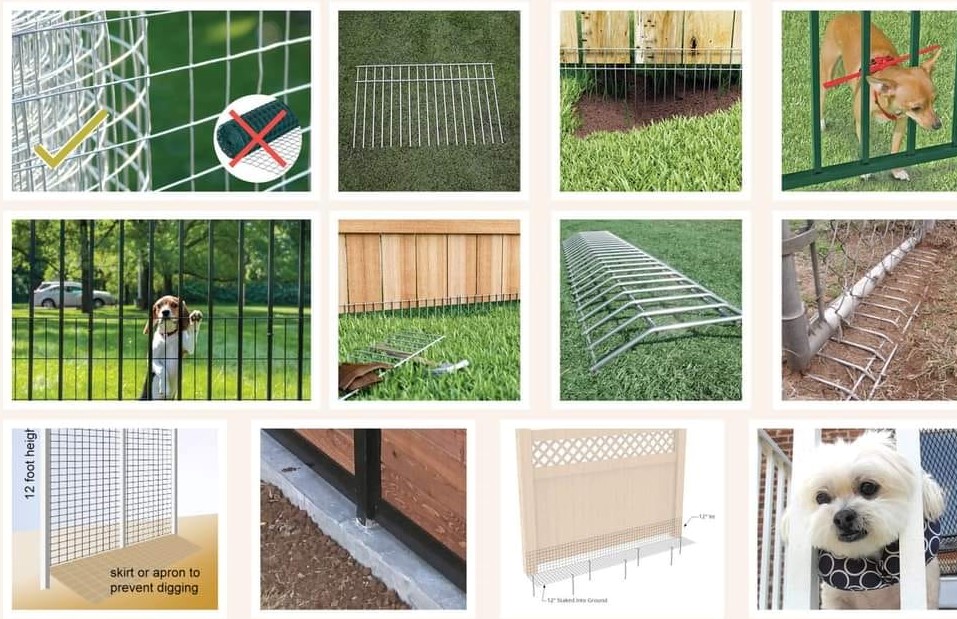
UNEARTHING THE TRUTH ABOUT DOGS AND THEIR DIGGING DEMEANOR
Dogs are some special creatures that we have domesticated for thousands of years. Even though they adapt well to living amongst humans, they still retain natural behaviour and digging is a very common one. It is deeply ingrained in their genetic makeup and it also serves various purposes in the wild. While it may seem frustrating or destructive for their guardians in a domestic setting, understanding the underlying reasons behind this behaviour can help dog guardians better manage and address it. In this article, we will delve deeper into this natural behaviour and explore why these paws are in action!
WHY DO DOGS DIG?
Dogs dig for a variety of reasons, stemming from their ancestral roots and innate instincts. Here are some of the main reasons why dogs exhibit digging behaviour:
- Instinctual Behaviour: Digging is a natural instinct for dogs that can be traced back to their wild ancestors. Wolves, from whom domestic dogs descended, dig dens for shelter, protection, and raising their young. This innate behaviour is deeply ingrained in their genetic makeup and can manifest in different ways. Digging may also be part of a nesting instinct, particularly if your dog is pregnant (hopefully she is spayed!).
- Seeking Comfort: Dogs may dig to create a comfortable resting spot. By digging and rearranging the ground or bedding, they can create a cool or warm area to lie down in, depending on the weather. It allows them to regulate their body temperature and find a cosy spot to relax.
- Hiding or Burying Possessions: Dogs often have a strong desire to bury their valued possessions, such as bones (this can be dangerous), toys, or treats. This behaviour mimics the ancestral behaviour of storing food for future consumption or hiding it from potential competitors. Digging and burying their prized items is an instinctual behaviour to protect and preserve their resources.
- Escape or Exploration: Dogs may dig in an attempt to escape from an enclosed area or to explore the world beyond their immediate surroundings. They might be driven by curiosity, the desire for freedom, or even boredom. Digging provides an outlet for their natural curiosity and allows them to investigate scents and sounds that pique their interest.
- Anxiety, Stress or Boredom: Some dogs may resort to digging as a coping mechanism for anxiety or stress. It can serve as a way to alleviate pent-up energy, frustration, or restlessness. Digging provides an outlet for their emotional state and can temporarily distract them from their worries.
- Breed-Specific Traits: Certain dog breeds have a higher predisposition to digging due to their genetic background or specific roles they were bred for. Terriers, for example, were historically bred for hunting vermin, and their digging abilities were crucial in pursuing prey underground.
- Maybe they just do it because it is fun!
Understanding the underlying motivations for a dog’s digging behaviour is essential in addressing and managing it effectively.

SOME BREEDS WILL DIG MORE THAN OTHERS
While digging behaviour can vary from dog to dog, certain breeds are known to have a higher predisposition to digging due to their genetic background or historical roles. Here are a few breeds that are often associated with a propensity for digging:
Terriers: Terrier breeds, such as Jack Russell Terriers, Dachshunds, and Yorkshire Terriers, have a strong instinct to dig. They were originally bred for hunting small game, and their digging abilities were crucial for pursuing prey into burrows and dens.
Hounds: Some hound breeds, including Beagles and Basset Hounds, have a natural inclination to dig. This behaviour may stem from their history of tracking scents and pursuing game through different terrains.
Dachshunds: As small hunting dogs originally bred for tracking and retrieving game, Dachshunds have a keen sense of smell and an instinct to dig. Their long bodies and strong front paws make them particularly adept at digging and burrowing.
Siberian Huskies: While their digging behaviour is not as pronounced as some other breeds, they may dig when they are bored, attempting to escape, or seeking a cool spot to lie down.
Australian Terriers: Australian Terriers, known for their energetic and adventurous nature, tend to dig. They were initially bred to control vermin in Australian mines, and their digging skills were essential for their work.
Remember that individual dogs within these breeds may exhibit varying degrees of digging behaviour. Additionally, it’s important to note that digging behaviour is not limited to specific breeds and can be observed in dogs of any breed or mixed breed.
HOW CAN I MANAGE DIGGING BEHAVIOUR
Your goal should never be to stop digging completely. It is a natural behaviour and all animals should have the freedom to display natural behaviour. If you’re looking to help your dog with digging behaviour, here are some strategies you can try:
- Provide a designated digging area: Create a specific area in your yard where your dog is allowed to dig. This can be a designated sandbox or a specific spot filled with loose soil. Encourage your dog to use this area by burying toys or treats in it. Offer lots of praise when they’ve done so. Read more on sensory gardens for your pets and creating pet-friendly gardens. Remember that certain plants may be toxic to your animals and be very careful if you use any pesticides or chemicals in your yard.
- Increase exercise and mental stimulation: Dogs that are bored or have excess energy may resort to digging as a form of entertainment or release. Ensure that your dog is getting enough physical exercise through daily walks, playtime, or engaging in activities like fetch. Additionally, provide mental stimulation through interactive toys, puzzle feeders, or training sessions to keep their minds occupied and reduce boredom.
- Supervise and distract: Always intervene calmly. If you catch them digging in an “off-limits” area, call them to you (or go fetch them if they have a selective hearing) and immediately guide (redirect) them to an appropriate activity or engage them in play in the designated area to redirect their energy. Use a distraction technique such as a firm “no” to redirect their attention. Never punish your dog for digging a hole. Even if you bring your dog to the dig site, he won’t be able to associate his digging with the punishment. After a bit of practice, your dog will learn that digging is only permitted in this spot.
- Ensure adequate space and enrichment: Dogs may dig out of frustration or a lack of mental stimulation. Make sure your dog has enough space to move around comfortably and explore. Provide them with toys, chew items, and interactive games to keep them engaged and entertained. Rotate toys regularly to maintain their interest.
- Positive reinforcement and training: Use positive reinforcement to reward your dog for desired behaviour. When they dig in the designated area or engage in appropriate activities, praise and reward them with treats, verbal cues, or a favourite toy. Consistency is key in reinforcing positive behaviour and helping them understand what is expected of them. The whole family should be consistent in this.
- Address underlying anxiety or stress: If your dog’s digging behaviour is driven by anxiety or stress, it’s important to address the underlying cause. Consult with a certified dog behaviourist (there is difference between trainer and behaviourist) or a veterinarian behaviourist to develop a behaviour modification plan. They can help you identify triggers and implement techniques to reduce your dog’s anxiety. Remember that behaviour doesn’t change overnight!
- Provide a cool area: Some dogs dig until they reach a cool layer of earth in which to rest. For these dogs, make sure they have a cool spot to relax in the warmer months. Reward them for relaxing in this area by associating this area with relaxed eating, grooming and affection.
Remember, patience and consistency are crucial when modifying your dog’s behaviour. It’s important to provide alternative outlets for their natural instincts and reinforce positive behaviour while redirecting them away from inappropriate digging. By understanding their needs and providing appropriate guidance and stimulation, you can help curb excessive digging behaviour in your dog.
SECURE YOUR YARD WELL WITH DIGGERS
If you have diggers, then it is crucial to secure your yard better! It’s not worth the risk of your pet escaping by taking half-measures if your dog has begun digging under your fence. Either prevent your dog from having any unsupervised time in the yard or get serious about a dig-proof barrier. Some advice from Petology.
- If they squeeze through or dig underneath your can buy or custom make metal dig-defence barriers with spikes, which goes deep into the ground. If your fence is secure, but not your gate, consider a gate plate.
- You can pour a concrete footer along the perimeter of the fence and bury/mount the bottom of the fence into the mixture.
- Install an L-Footer/skirt/apron along the bottom of the fence, facing inwards. You can use a wire mesh fence, hardware cloth or a piece of chain-link fence attached to the base of the fence. Bury it so that it is not visible to the eye, or lay it on top of the grass and hold it down with pins/stakes, rocks, gravel, mulch or even planters.

Also, read about choosing pets for your child.
In conclusion, digging is a natural behaviour for dogs that can be influenced by a variety of factors, including instinct, comfort-seeking, territorial instincts, curiosity, and anxiety. While it may be frustrating or destructive in a domestic setting, understanding the reasons behind this behaviour can help you address it effectively. By providing appropriate outlets for your dog’s digging instincts, such as designated digging areas, increasing exercise and mental stimulation, supervising and redirecting their behaviour, and addressing any underlying anxiety or stress, you can help manage and reduce excessive digging.
With time, effort, and understanding, you can help your dog find more appropriate ways to satisfy their natural instincts and create a harmonious and happier environment for both you and your canine excavator!
Next week we will look at compassion fatigue in the animal welfare setting.